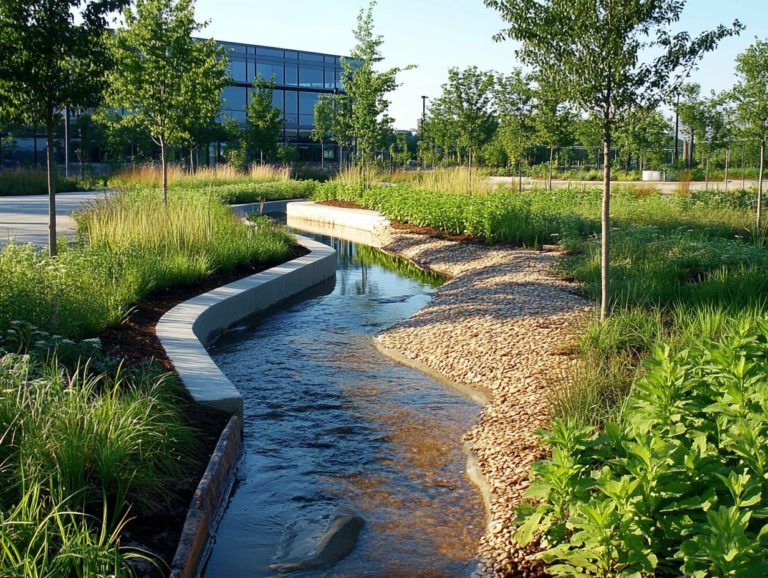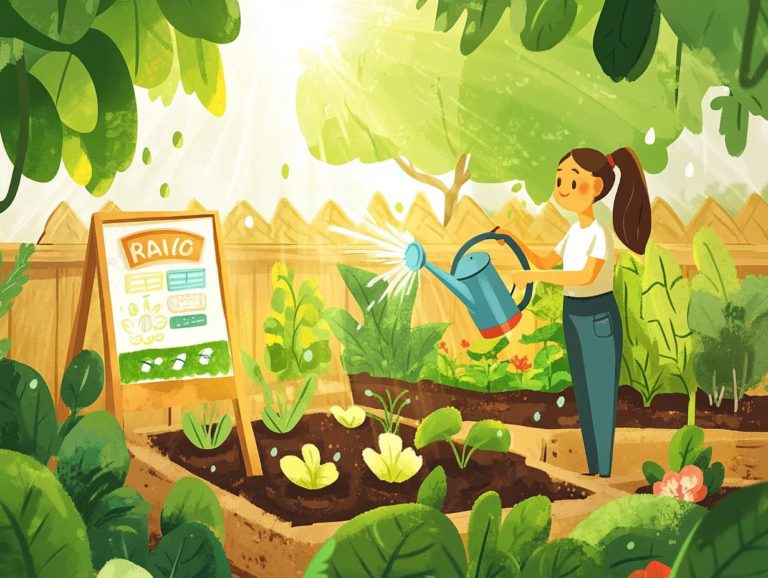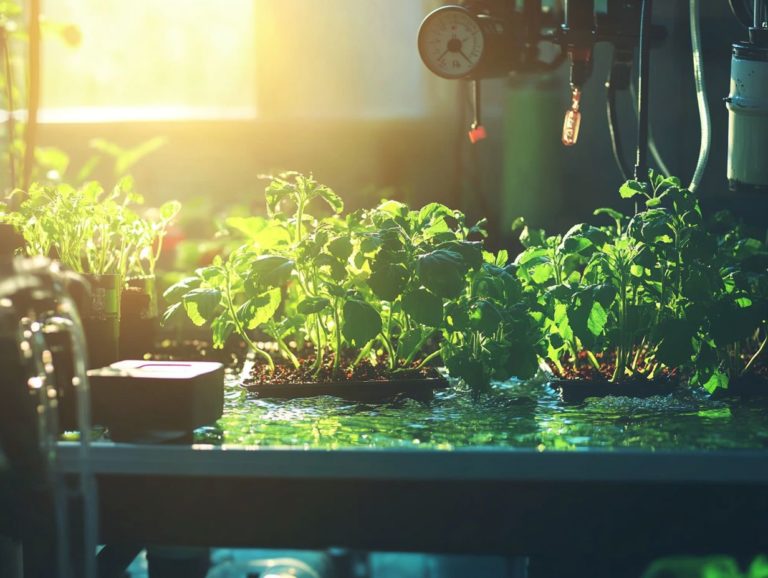The Importance of Water in Soil Health
Soil health stands as a cornerstone of sustainable agriculture and ecosystem vitality. Yet, many may not fully appreciate the critical role water plays in this delicate balance.
Dive into the essential role of water in soil health. Your understanding can transform farming and protect our ecosystems!
This article delves into the essence of soil health and the various factors that shape it, placing particular emphasis on water. You ll discover how water impacts soil structure, nutrient availability, and the challenges posed by waterlogging and drought.
We also explore practical irrigation techniques and strategies for enhancing soil health through effective water management. Join in as you unravel the intricate relationship between water and soil vitality, paving the way for healthier ecosystems and more productive farming practices.
Contents
- Key Takeaways:
- Understanding Soil Health
- The Role of Water in Soil Health
- Managing Water for Optimal Soil Health
- Improving Soil Health Through Water Management
- Frequently Asked Questions
- What role does water play in maintaining healthy soil?
- How does water affect soil structure?
- Why is water important for nutrient availability in soil and nutrient conservation?
- How does water impact the growth of plants and soil moisture?
- What happens to soil health in periods of drought and climate change?
- How can farmers and homeowners ensure proper water management for healthy soil and sustainable agriculture?
Key Takeaways:
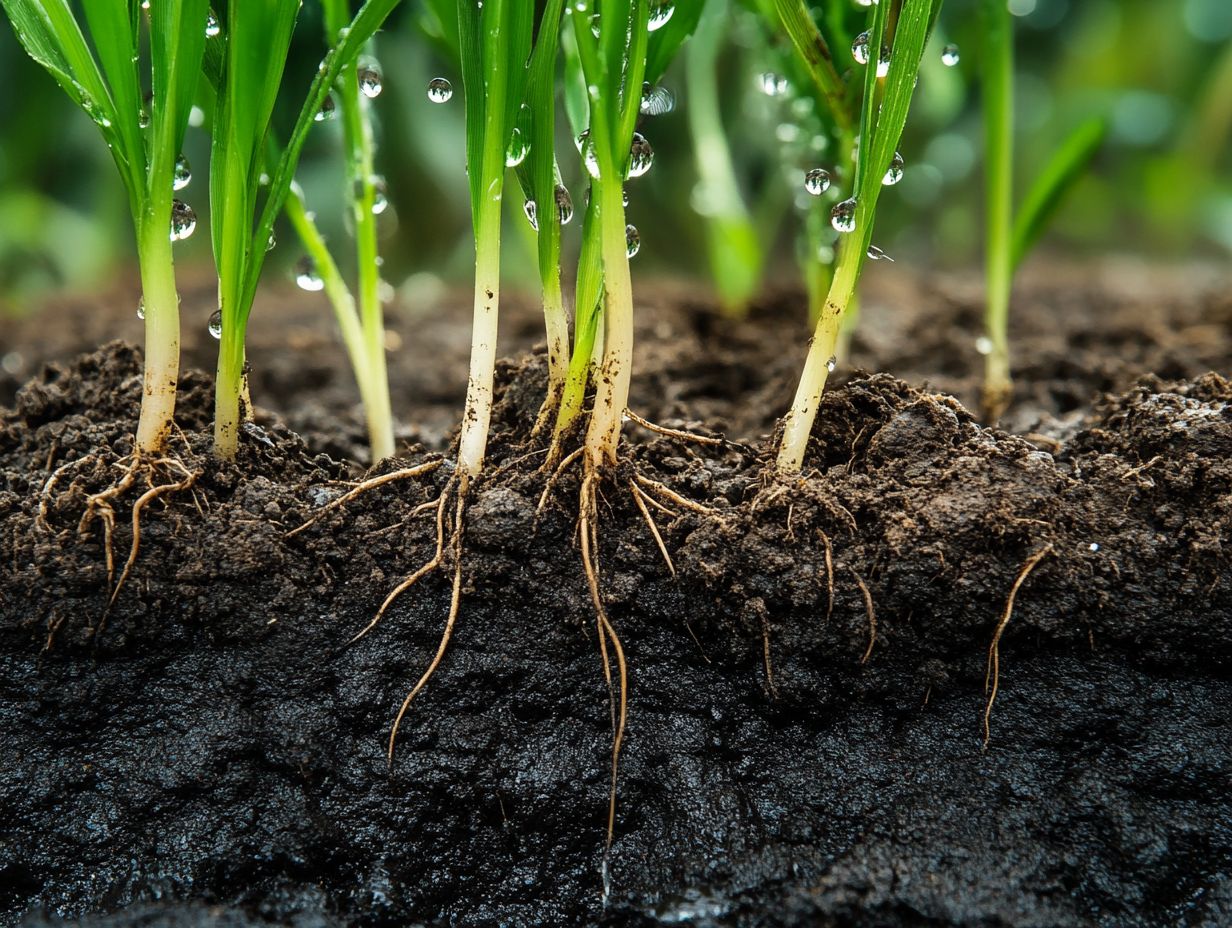
- Water plays a crucial role in promoting soil health as it affects soil structure and availability of nutrients. Proper water management is necessary to prevent waterlogging and drought, which can negatively impact soil health.
- Effective water management practices, such as proper irrigation techniques and water conservation, are essential for maintaining optimal soil health. These practices can help improve soil quality and increase productivity.
- To improve soil health, it is important to incorporate strategies that focus on water management. This includes improving soil by using methods like covering it with organic material, cover cropping, and proper drainage to maintain a healthy balance of water in the soil.
Understanding Soil Health
Understanding soil health is essential for your journey into sustainable agriculture and effective environmental stewardship. It encompasses the biological, chemical, and physical properties of soil that directly influence the productivity and ecological balance of your agricultural systems.
Healthy soil is a powerhouse, offering vital nutrients for your crops and supporting biodiversity. It plays a crucial role in water quality and retention.
Adopting soil management practices like crop rotation and utilizing cover crops can significantly boost soil organic matter and prevent erosion. By doing so, you re not just enhancing your current yield; you re also ensuring that future generations inherit a fertile and productive landscape.
Definition and Factors Affecting Soil Health
Soil health signifies the capacity of soil to sustain both plant and animal productivity, while also maintaining or enhancing water and air quality and promoting the well-being of living organisms.
This concept extends far beyond simple fertility; it encompasses the complex interrelationships among various soil properties that contribute to a robust ecosystem. Several key factors influence soil health, including the composition of minerals and organic matter, the structure that dictates its porosity and permeability, and the availability of essential nutrients that foster plant growth.
Healthy soil serves as the cornerstone of agricultural systems, profoundly affecting crop yields and overall biodiversity. When soil is enriched with organic matter, it boosts nutrient retention and enhances water infiltration and microbial activity, fostering a vibrant environment that supports a myriad of life forms.
The Role of Water in Soil Health
Water is essential for maintaining soil health, as it influences soil structure, nutrient availability, and the overall functionality of soil ecosystems. Ensuring an adequate water supply enhances soil moisture, which is vital for plant growth and microbial activity.
This not only promotes nutrient cycling but also helps prevent soil degradation. Poor water quality can create pollution challenges and negatively impact soil health, highlighting the importance of implementing effective water management strategies in sustainable agriculture.
Water’s Impact on Soil Structure and Nutrient Availability
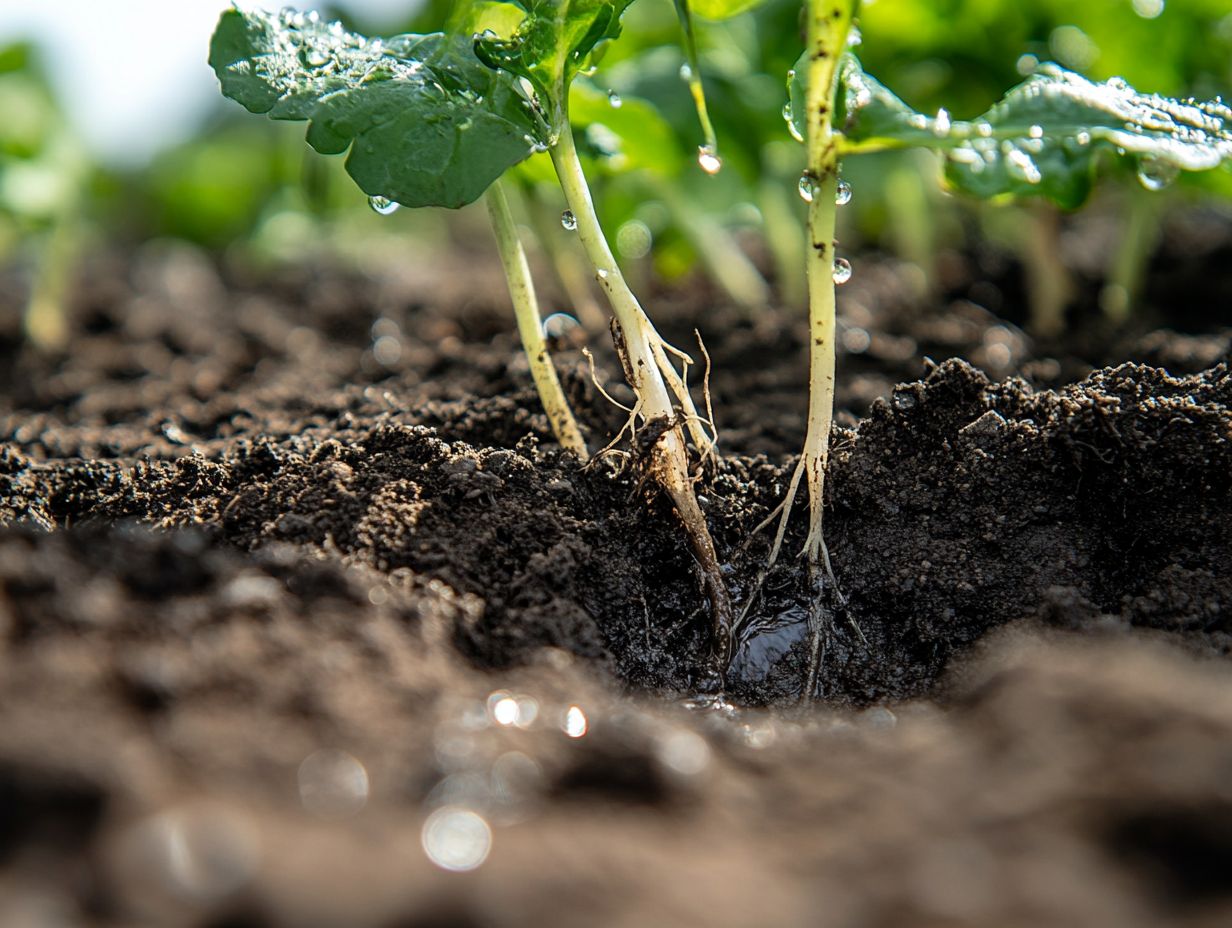
The quality and availability of water profoundly affect soil structure and nutrient availability. This directly impacts how well your soil can support robust crops and thriving ecosystems.
When water infiltrates the soil, it creates and maintains its physical structure. This process helps bind soil particles together, improving aeration (the process of allowing air into the soil) and drainage. As a result, roots gain better access to essential nutrients.
However, poor water quality can lead to nutrient leaching and soil compaction, which can severely compromise agricultural productivity. Clean water, rich in minerals and free from pollutants, fosters a vibrant soil ecosystem that aids in nutrient conservation.
Implementing effective water management practices is crucial for the sustainability of water resources and for preserving the overall health and fertility of your soil.
Effects of Waterlogging and Drought on Soil Health
Waterlogging and drought are two extreme conditions that can disrupt your soil’s health. These conditions influence moisture levels, nutrient content, and the overall ecological balance.
When your soil becomes saturated with excess water, low oxygen conditions can set in. This leads to a decline in vital soil microorganisms crucial for nutrient cycling. As these beneficial organisms struggle to survive, the availability of essential nutrients decreases, severely crippling plant growth.
Drought conditions dry out and compact the soil, stunting root development and hampering nutrient absorption. This highlights the urgent need for sustainable farming practices that focus on effective water management and soil conservation. Embracing these practices can ensure that both waterlogged and drought-stricken environments support healthy ecosystems.
Such practices enhance soil resilience and foster agricultural sustainability for future generations.
Managing Water for Optimal Soil Health
Effective water management is crucial for optimizing soil health. It significantly impacts soil moisture levels, nutrient cycling, and plant growth.
By implementing appropriate irrigation practices and water conservation strategies, you can enhance water retention and infiltration. This supports the long-term sustainability of agricultural lands while fostering vibrant ecosystems.
Adopting sustainable agricultural practices, such as integrating cover crops and rotating crops, will strengthen your water management efforts. This leads to improved soil health and productivity.
Irrigation Techniques and Water Conservation
Irrigation techniques are essential for managing water resources effectively. They ensure optimal soil health and maximize crop productivity.
- Drip irrigation: Delivers water directly to the roots of plants, reducing evaporation and runoff.
- Sprinkler irrigation: Uses a network of pipes, pumps, and sprinklers to create a rain-like effect, ensuring uniform water distribution across the field.
Both techniques conserve water and maintain consistent soil moisture levels, which are crucial for plant growth.
By implementing these methods, you play a vital role in promoting sustainable agriculture. This enhances water efficiency and mitigates the risk of soil erosion. Ultimately, you achieve optimal soil management, enabling crops to flourish while safeguarding essential water resources for future generations.
Improving Soil Health Through Water Management
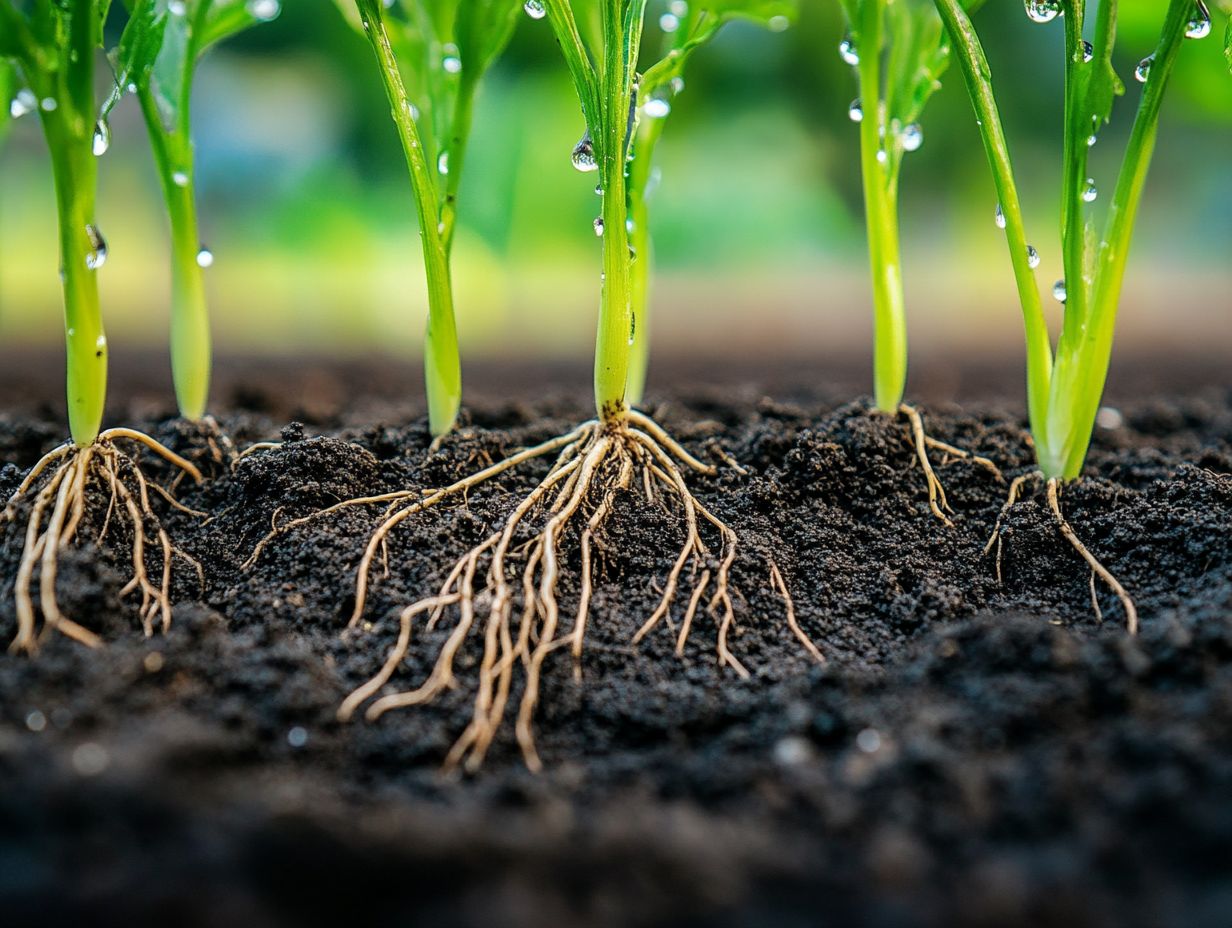
Enhancing soil health through effective water management is paramount for sustainable agricultural practices. Prioritizing this approach ensures the long-term viability of your farming systems, fostering resilience and productivity for years to come.
Unlocking the Secrets to Thriving Soil and Bountiful Crops
Want to boost your crops and support the planet? Here are some powerful strategies to enhance soil quality and productivity!
Enhancing soil quality often requires a holistic approach that embraces sustainable farming practices and effective nutrient management.
One effective strategy is crop rotation, which diversifies plant species and helps break pest cycles. This ultimately reduces reliance on chemical pesticides. Another approach is implementing cover crops. Cover crops are plants grown between main crops to improve soil health. They significantly enhance soil structure and increase organic matter, fostering biodiversity by creating habitats for various organisms.
Utilizing soil amendments, such as compost a mixture of decomposed organic matter and biochar, a type of charcoal used to improve soil health, not only delivers essential nutrients but also enhances moisture retention and minimizes pollution runoff.
Collectively, these practices contribute to healthier ecosystems, making your farming endeavors more resilient while promoting sustainability and conserving precious natural resources.
Frequently Asked Questions
What role does water play in maintaining healthy soil?
Water is crucial for the health of soil. It helps to transport nutrients, maintain soil structure, and support the growth of microorganisms.
How does water affect soil structure?
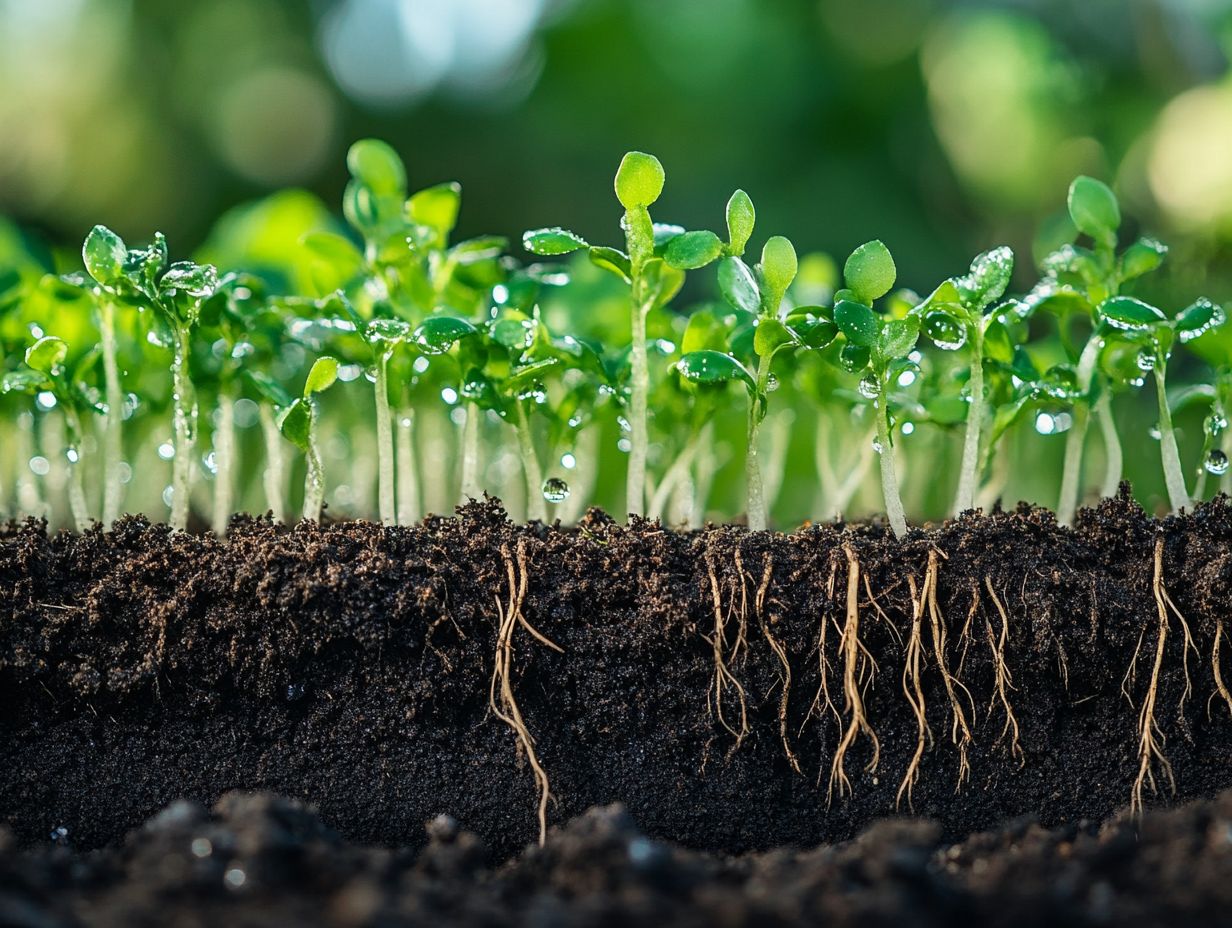
Water binds soil particles together, creating pore spaces that allow air and nutrients to flow through. This improves soil aeration and drainage, which is vital for plant growth and overall water quality.
Why is water important for nutrient availability in soil and nutrient conservation?
Water acts as a carrier for soil nutrients, allowing them to move through the soil and reach plant roots. Without water, nutrients remain locked in the soil and unavailable for plants, which can lead to issues like nutrient runoff.
How does water impact the growth of plants and soil moisture?
Water is essential for healthy soil and plant growth. It helps maintain turgidity, which is the pressure inside plant cells that keeps them firm and upright. Without enough water, plants can wilt and die, leading to soil degradation.
What happens to soil health in periods of drought and climate change?
Drought negatively impacts soil health by reducing water availability for plant growth. It can lead to soil compaction, affecting soil structure and hindering air and nutrient flow, making it difficult for plants to thrive.
How can farmers and homeowners ensure proper water management for healthy soil and sustainable agriculture?
Proper water management includes techniques like mulching, watering deeply but infrequently, and using drip irrigation. These regenerative organic agriculture practices help maintain soil moisture levels and promote healthy plant growth.
Do you have your own questions or experiences related to soil health? Share them with us!
Start implementing these strategies today for a healthier garden and a more sustainable future!

